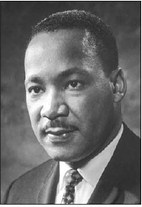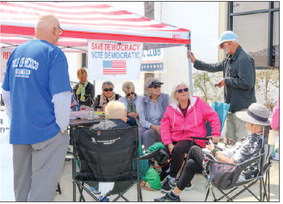Dr. Martin Luther King—Honoring the Legacy


IN APPRECIATION
In 1966, Dr. Martin Luther King Jr. famously said that riots are the “language of the unheard.” He also said, “There’s no practical or moral answer in the realm of violence,” and “there is no violent solution” to social injustices, and “riots are socially destructive and self-defeating.”
These words ring true today in the wake of the Jan. 7 tragedy that saw five fatalities after hundreds of Americans stormed the U.S. Capitol.
Monday, Jan. 18, 2021, will mark America’s 36th celebration of Martin Luther King Jr. Day. Honoring Dr. King with the sacred status of a federal holiday—of which there are only 10 and none named for a 20th-century person—is a testament to the unifying power of his legacy.
King’s most important work applied America’s founding ideals to the cause of civil rights. True racial progress, King taught, demanded solidarity, that people treat each other as equals. And for that to happen, a bond far stronger than either race or politics is needed. For King, that bond was America and the Constitution upon which America is grounded: “We the People of the United States, in Order to form a more perfect Union, establish Justice, ensure domestic Tranquility, provide for the common defence, promote the general Welfare, and secure the Blessings of Liberty to ourselves and our Posterity, do ordain and establish this Constitution for the United States of America.”
“We the People” unity is needed more than ever in these times of pandemic, and social and political unrest.
King loved America and realized that “civil rights” are rooted in the fair and equal participation of all citizens in the American community. For those rights to have any power, the bonds of community must be close-knit and resilient.
I have a dream that one day this nation will rise up and live out the true meaning of its creed: ‘We hold these truths to be self-evident, that all men are created equal.
In the spirit of the King’s legacy, read on for some of the man’s greatest and most inspirational teachings, an enduring antidote to our times.
• “I criticize America because I love her,” King said in a speech about the Vietnam War, “and because I want to see her to stand as the moral example of the world.”
• “Every man must decide whether he will walk in the light of creative altruism or in the darkness of destructive selfishness.”
• “Science investigates; religion interprets. Science gives man knowledge, which is power; religion gives man wisdom, which is control. Science deals mainly with facts; religion deals mainly with values. The two are not rivals.”
• “The function of education is to teach one to think intensively and to think critically. Intelligence plus character—that is the goal of true education.”
• “All labor that uplifts humanity has dignity and importance and should be undertaken with painstaking excellence.”
• “An individual has not started living until he can rise above the narrow confines of his individualistic concerns to the broader concerns of all humanity.”
• “Rarely do we find men who willingly engage in hard, solid thinking. There is an almost universal quest for easy answers and half-baked solutions. Nothing pains some people more than having to think.”
• “Every man lives in two realms: the internal and the external. The internal is that realm of spiritual ends expressed in art, literature, morals and religion.
The external is that complex of devices, techniques, mechanisms and instrumentalities by means of which we live.”
• “Shallow understanding from people of good will is more frustrating than absolute misunderstanding from people of ill will.”
• “There comes a time when people get tired of being pushed out of the glittering sunlight of life’s July and left standing amid the piercing chill of an alpine November.”
• “The past is prophetic in that it asserts loudly that wars are poor chisels for carving out peaceful tomorrows.”
• “The limitation of riots, moral questions aside, is that they cannot win, and their participants know it.
• “Hence, rioting is not revolutionary but reactionary because it invites defeat. It involves an emotional catharsis, but it must be followed by a sense of futility.”

Dr. Martin Luther King Jr.




